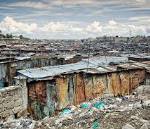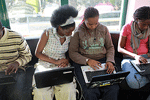Kenya
|
Kenya: Governance is the key to sustainability
“Devolution” is a key governance issue in Kenya to overcome “rampant corruption and impunity”, identified by civil society as the major obstacle to the realization of the SDGs. The “handshake”, a political alliance between the President Uhuru Kenyatta and the main opposition leader and former Prime Minister Raila Ondinga, has cooled the political temperatures that led to violence after the 2017 election. Nevertheless, the decentralization promised in the Constitution of 2010 has been affected by “ absence of consultation on matters that affect County Governments, little technical support for the implementation of functions, insufficient allocations and delayed disbursements of funds to Counties by the National Treasury, lack of capacity and skills to deliver services, corruption, lack of public participation, and gender inequality”.
The shadow report on SDG implementation, submitted by SODNET & Ujeengo Global Community Consortium (Consortium on International Development Projects in Kenya -CIDPK) explains that “with devolution, each county has an equitable share of government resources, governed by a set of criteria that include: economic disparities within and among counties and the need to remedy them; the desirability of stable and predictable allocations of revenue; and the need for economic optimization of each county and to provide incentives to optimize its capacity to raise revenue.
Among the problems identified, the report studies the fate of youth, economic and gender inequalities, food insecurity and unpaid care and domestic work.
|
Published on Wed, 2018-11-07 17:44

|
In Kenya the NGO SODNET reports that “the widening gap between the rich and the poor continues to undermine confidence in the institutions of democratic economic governance and, alongside it, the imperative of social cohesion as a condition for sustainable development”. According to Edward Oyugi, J. Ocholla and Mwaura Kaara “Kenya still lives uneasily with a colonial past and its legacy of unequal development, arising from acute asymmetry of power relations associated with the continuation of a colonial system that had merely engaged a strategic retreat gear against the false belief that the post-colonial dispensation marked a systemic transformation of the colonial societies.” The report concludes that democracy and sustainable development remain “a dream” because “the culture and practice of corruption has grown deep and enduring roots in Kenyan society and become endemic” and allows for concentration of wealth within the ruling circles. The political and bureaucratic leadership benefit from it “and the existing governance institutions either kick the can down the road or lack both the will and capacity to stop them from doing so”.
|
|
Gross inequalities, arising from and seriously compounding the obscene accumulation and concentration of wealth, have become the defining issue of our time. In some quarters, particularly those inhabited by die-hard market fundamentalists, contrary to the existential threats it invokes, it is believed to be a universal default setting of human society – ordained by Fukuyama-ist end-of-history normalcy, leave alone, finality. As a critical element of the ever- deepening crisis, it is producing a toxic political-economic and ecological situation, the adverse historical implications to which neoliberal political dispositions remain unresponsive, if not utterly oblivious. No wonder it has become the single most important challenge facing humankind, particularly in respect to the accompanying deficit in democratic governance and peaceful coexistence between different sections of societies and even between nations.
|
Published on Fri, 2017-09-15 14:45
The Kenya Social Watch report registers “heavy and unprecedented investment in mega-infrastructure projects.” Instead of spurring equitable economic growth these initiatives are placing on the national economy an unbearable debt burden of some US$ 50 billion.
The report states that “the growth-leading sectors have not only been broadly based but also have performed poorly, particularly in respect to poverty-reduction and equity-inducing policy dispensations and accompanying strategic instruments. Decreased activity in the agricultural and manufacturing sectors have induced a jobless growth that has had the effect of a flood in the wake of which not all the boats could be lifted. Instead it has rendered Kenya one of the most unequal societies in the world.”
|
Published on Sun, 2016-06-05 21:09
 |
The successful implementation of the 2030 Agenda requires bold and transformative steps that are urgently needed to shift the world on to a sustainable and resilient path. In order for it to be a collective journey, on which no one should be left behind, the scale and ambition of the 17 Sustainable Development Goals and 169 targets require a broad and integrated approach not only to balancing and realigning the normative architecture of the global economy but also to restructuring regional and national political-economic practices. Politics as usual and economics as the determined by the rich and powerful will have no place on this new path. Merely tinkering with uncomfortable edges of the micro-economic status quo will not do. The historical direction and social-structural content of such a shift will involve the modification of the deep structures of poverty in the periphery economies up to and including addressing the different aspects of state autonomy and the underlying democratic deficits that stand on the way of building sustainable national economies.
|
|
The successful implementation of the 2030 Agenda requires bold and transformative steps that are urgently needed to shift the world on to a sustainable and resilient path. In order for it to be a collective journey, on which no one should be left behind, the scale and ambition of the 17 Sustainable Development Goals and 169 targets require a broad and integrated approach not only to balancing and realigning the normative architecture of the global economy but also to restructuring regional and national political-economic practices. Politics as usual and economics as the determined by the rich and powerful will have no place on this new path. Merely tinkering with uncomfortable edges of the micro-economic status quo will not do. The historical direction and social-structural content of such a shift will involve the modification of the deep structures of poverty in the periphery economies up to and including addressing the different aspects of state autonomy and the underlying democratic deficits that stand on the way of building sustainable national economies.
|
Published on Fri, 2014-10-24 10:03
In Kenya InfoNET seeks to improve public service delivery and participation through the strategic use of Technology
InfoNET participated in tweet sessions where live tweets were beamed on screens and responded to in real time, for transparency that seeks to improve public service delivery through the strategic use of Technology.
|
Published on Wed, 2013-10-16 18:00
Huduma is an initiative of INFONET previously incubated at SODNET (Social Watch in Kenya), the United Nations Millennium Campaign and the African Institute for Health and Development (AIHD) that seeks to improve public service delivery through the strategic use of Technology.
The strategy is coined within a logic of improving the capability of the state and that of an informed citizen to collectively improve service. While the state remains the largest provider or guarantor of services, the citizenry have a right and responsibility to engage in the improvement of such services. Huduma places in the hands of citizens, simple technology and media based tools and platforms to amplify their voices, while at the same time, improves the capacity for better responsiveness.
|
SUSCRIBE TO OUR NEWSLETTER
Submit

|





